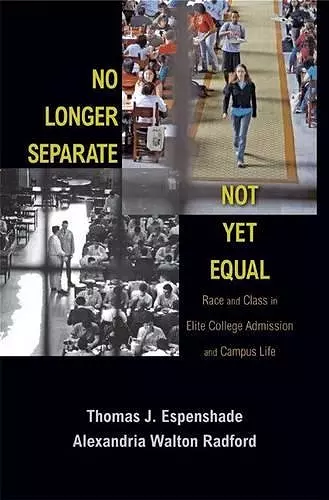No Longer Separate, Not Yet Equal
Race and Class in Elite College Admission and Campus Life
Thomas J Espenshade author Alexandria Walton Radford author
Format:Hardback
Publisher:Princeton University Press
Published:20th Nov '09
Currently unavailable, and unfortunately no date known when it will be back
This hardback is available in another edition too:
- Paperback£30.00(9780691162133)

This original and important book contributes to our understanding of college admissions, as well as the interracial social experiences and growing economic inequality in selective higher education today. Particularly interesting are the simulations of what racial and class compositions might be under different types of admissions criteria, including race-blind and class-sensitive conditions. -- Caroline Hodges Persell, New York University I am impressed by the depth and breadth of this well-written and accessible book--it represents an important contribution to the literature about how race and class affect college admissions and student life. -- Elizabeth A. Duffy, Head Master, The Lawrenceville School
Arguing that elite higher education contributes to both social mobility and inequality, the authors investigate such areas as admission advantages for minorities, academic achievement gaps tied to race and class, unequal burdens in paying for tuition, and satisfaction with college experiences.Against the backdrop of today's increasingly multicultural society, are America's elite colleges admitting and successfully educating a diverse student body? No Longer Separate, Not Yet Equal pulls back the curtain on the selective college experience and takes a rigorous and comprehensive look at how race and social class impact each stage--from application and admission, to enrollment and student life on campus. Arguing that elite higher education contributes to both social mobility and inequality, the authors investigate such areas as admission advantages for minorities, academic achievement gaps tied to race and class, unequal burdens in paying for tuition, and satisfaction with college experiences. The book's analysis is based on data provided by the National Survey of College Experience, collected from more than nine thousand students who applied to one of ten selective colleges between the early 1980s and late 1990s. The authors explore the composition of applicant pools, factoring in background and "selective admission enhancement strategies"--including AP classes, test-prep courses, and extracurriculars--to assess how these strengthen applications. On campus, the authors examine roommate choices, friendship circles, and degrees of social interaction, and discover that while students from different racial and class circumstances are not separate in college, they do not mix as much as one might expect. The book encourages greater interaction among student groups and calls on educational institutions to improve access for students of lower socioeconomic status. No Longer Separate, Not Yet Equal offers valuable insights into the intricate workings of America's elite higher education system.
Winner of the 2011 Pierre Bourdieu Book Award, Sociology of Education Section of the American Sociological Association "Both supporters and opponents of affirmative action are likely to find ammunition in Thomas J. Espenshade's and Alexandria Walton Radford's book... The authors provide a fascinating peek inside the admissions process at several unnamed universities."--Richard D. Kahlenberg, The Book, the online review at New Republic "This is a big book, exhaustively researched and packed full of facts, numbers, and prose... No Longer Separate, Not Yet Equal is a must-have reference for everyone who pays attention to race and class controversies in higher education."--Robert VerBruggen, National Review "Ultimately, [the authors] argue that the most important step toward eliminating inequity in higher education and society is to close the achievement gap, and they call for the creation of an effort on the scale of the Manhattan Project to do it."--Angela P. Dodson, Diverse Education "With this incisive new book, Espenshade and Walton Radford explore the dynamics of differential college access and success in extraordinary detail... The book's most significant contribution may be its persuasive, data-based analysis of affirmative action. This book is a must-read for anyone interested in higher education's role in creating a more equitable society."--Diversity & Democracy "The authors cover a broad range of elite college admission issues that go beyond race and class, offering detailed perspectives on affirmative action. Researchers of equity issues in higher education, particularly in the selective college admission process as well as college counseling professionals will find, in this thorough and extensive work of research, tools to help clear up what may seem 'mysterious or secret' in the selective college admission process."--Joe Adegboyega-Edun, NACACNet "Espenshade and Radford have produced a highly valuable book packed with useful race-based information relating to admission, academic performance, and ethnic group interaction on elite college campuses... The data offers sound arguments for the need to not only continue race-sensitive affirmative action both in college and graduate school admissions but also in the workplace."--Journal of Blacks in Higher Education "The thoughtful work of Espenshade and Radford represented in this significant volume should be just the beginning of the next phase of the ongoing national conversation about he role of higher education in providing equality of opportunity and social mobility. This book provides a useful framework for additional research and policy development."--Jonathan Alger, Journal of College and University Law "Espenshade and Radford have produced the most comprehensive and best study yet of admissions and race relations in America's leading colleges and universities."--Steven Brint, American Journal of Education
- Winner of American Sociological Association Sociology of Education Pierre Bourdieu Book Award 2011
ISBN: 9780691141602
Dimensions: unknown
Weight: 907g
568 pages